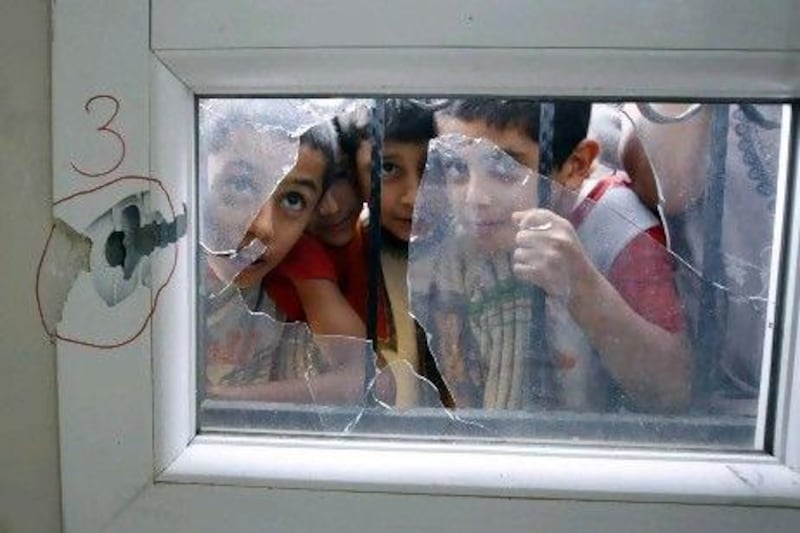The United Nations refugee agency yesterday said Lebanon had become the third country to host more than 100,000 registered refugees from Syria as the effects of its civil war become increasingly felt in neighbouring countries.
The UN high commissioner for refugees spokeswoman, Melissa Fleming, said at least 101,283 people had registered as refugees in Lebanon. Jordan has more than 105,000 registered refugees, she said, while government-run camps in Turkey hold at least 101,000 people who have fled fighting in Syria.
Syrian warplanes yesterday struck a strategic rebel-held town in the country's north in an attempt to reopen a key supply route, activists said, as a UN-proposed ceasefire meant to start this week appeared increasingly unlikely to take hold.
Lakhdar Brahimi, the UN-Arab League envoy to Syria, had suggested that both sides in Syria's 19-month-old conflict lay down their arms during Eid Al Adha. However, neither the Syrian president, Bashar Al Assad, nor rebels fighting to topple him have committed to a truce, and Mr Brahimi has not said how such a truce would be monitored.
Yesterday's airstrikes on Maaret Al Numan and the village of Mar Shamsheh came as troops and rebels battled over a nearby Syrian military camp that has been under siege, according to the Britain-based Syrian Observatory for Human Rights, an activist group.
Opposition fighters seized Maaret Al Numan, which lies along the main road between Aleppo and the capital Damascus, earlier this month, and their presence there has disrupted the regime's ability to send supplies and reinforcements to the northwest. That has hampered the government's fight in Aleppo, where government troops are bogged down in a bloody fight for control of the country's largest city.
The fighting in the area spilled over the border again into Turkey yesterday when a Syrian anti-aircraft shell entered a room in a health centre in the Turkish town of Reyhanli, about 200 metres from the border. No injuries were reported.
There were no reports of a response from Turkey, which mobilised troops along the border after Syrian shells killed five Turkish civilians earlier this month.
In Lebanon, where sectarian tensions have been reignited after a car bombing blamed on Syria that killed a top intelligence official on Friday, an opposition MP said he and four colleagues were texted death threats from a Syrian telephone number before and after the attack.
Ammar Houry, a member of the anti-Syrian March 14 coalition, said on television that on the eve of the attack, they received a text from a Syrian number that threatened to "get you one by one".
"At the time, we didn't pay any attention to it, until the assassination of General Wissam Al Hassan," Mr Houry said.
"After the assassination, we received a second SMS that read: 'Congratulations, the countdown has begun. One of 10 eliminated.'"
Al Hassan was noted for his investigation of Syrian political crimes in Lebanon.
Meanwhile in Jordan, police said they had arrested seven Syrians carrying 35 "advanced" walkie-talkies, which are banned in the kingdom.
"The seven Syrian men were arrested on Monday in Amman and Irbid," said Mohammed Khatib, a police spokesman. "In addition to the 35 advanced walkie-talkies, which are illegal here, they had types of receivers that can be directly linked to satellites, personal computers and a night vision device."
The arrests follow Jordan's announcement on Sunday that it had foiled a "terrorist plot" and arrested 11 Jordanian Al Qaeda suspects who had returned from Syria and were planning to carry out suicide attacks against shopping malls, foreigners and diplomatic missions in the kingdom.
* With reporting from Associated Press and Agence France-Presse





